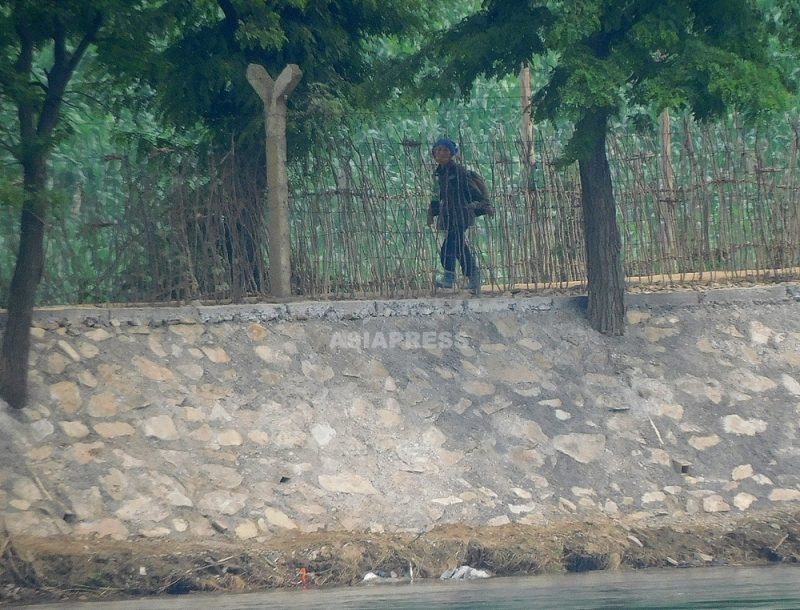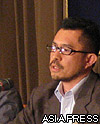
“The biggest thing I regret in my life is not defecting. When will we be able to live as human beings? Everyone here is envious of people in South Korea and China.”
In mid-November, as North Korea continued to fire off a series of missiles, ASIAPRESS communicated with a reporting partner living in the northern part of the country by phone. She is a single mother with two children. When ASIAPRESS asked her about the missile tests, she responded to the question as shown above.
A river flows between the North Korean and Chinese border a couple of kilometers away from her house. She hasn’t been able to even think about defecting across the border with her children because of the fear of being punished if they were caught and forcibly repatriated back to North Korea. For the past two or so years, the river levies have been obstructed with barbed wire, making it impossible for people to even approach the river’s banks. Perhaps she is regretting not having defected from the country before security was tightened along the border.
Kim Jong-un will soon have been at the pinnacle of power in North Korea for 11 years. When the young leader, then in his late 20s, first appeared, many people expressed hope that he would implement new policies aimed at opening the country to the wider world. After his purging and killing of his uncle, the powerful Jang Song-taek, in 2013, an atmosphere of fear permeated the society.
The mood between the two Koreas changed when Kim Jong-un met with South Korean President Moon Jae-in in 2018. North Koreans were happy, thinking that finally an era of peace and abundance would arrive. The next year, however, the failure of denuclearization negotiations with the Trump administration led to a quick shift in the inter-Korean atmosphere. The Kim Jong-un regime cutoff relations with South Korea and, using efforts to combat COVID-19 as pretext, enacted strict measures to control the population.
The regime shutdown its borders, prohibiting movement between regions and banned private economic activities as “anti-socialist behavior,” including the hiring of employees, selling bread to sell in markets, and operating restaurants in private homes. Urbanites saw a drastic fall in their cash incomes, plunging them into poverty.
The reporting partner told ASIAPRESS that, “Enforcers stop people at random on the streets to check their clothing, whether they’re wearing masks, and to exam their personal belongings. They even demand to see messages or pictures saved on people’s phones. It’s become natural for (the authorities) to conduct house searches without warrants.”
At the end of 2020, North Korea enacted the “DPRK Law Rejecting Reactionary Thought and Culture,” which levels jail time of five years on those who just watch South Korean dramas. Even today, ASIAPRESS understands that the authorities continue to arrest mainly young people for violating the law.
North Korea has test launched around 60 missiles since the start of this year. The cost of launching all those missiles is likely in the tens of millions of dollars. ASIAPRESS’s reporting partner didn’t conceal her anger at this, saying during the interview that, “What’s the use of national defense and missiles when they’re starving the people?” The UN has estimated that more than 40% of North Koreans are suffering from malnutrition. Over the last 11 years of Kim Jong-un’s rule, it’s clear that North Korea’s human rights situation has only grown worse.
On November 16, the UN General Assembly’s Third Committee (human rights) criticized North Korea’s organized and wide-ranging human rights abuses, adopting a resolution calling on improvements in the country’s human rights situation. These resolutions have been adopted annually for the past 18 years. In its criticism of the resolution, the Kim Jong-un regime said that “(North Koreans) are enjoying genuine human rights that thoroughly correspondent with the ideals and demands of the people,” further saying that the country doesn’t have any human rights issues and claiming that the interference of the US and its subordinate powers in its internal affairs is aimed at overthrowing the country’s government.
While the world’s focus is on North Korea’s nuclear weapons and missiles, I would like to suggest we show interest in the suffering of North Korea’s ordinary people.
- <Interview with a N. Korean> (2) Speaking honestly about N. Korea’s poverty…“I’m angry whenever I hear about missiles and I want to live like a human being”
- <Interview with a N. Korean> (1) “It’s ridiculous that the government launches missiles while its people remain starving”
- <Inside N. Korea> Government sets nighttime curfew at 6 PM..."Police arrest anyone who leaves their homes..." Why now?
- <Inside N. Korea>What happened to N. Korea’s cash vouchers “tonpyo”?
- <Inside N. Korea>N. Korea takes issue with high school students taking videos of kissing, dancing, fighting, and harassing the homeless



![[Video Report] There is no water! N.Korean People's 'Water War' because of water shortage](https://www.asiapress.org/rimjin-gang/wp-content/uploads/2018/07/20130625_water-150x150.jpg)





















